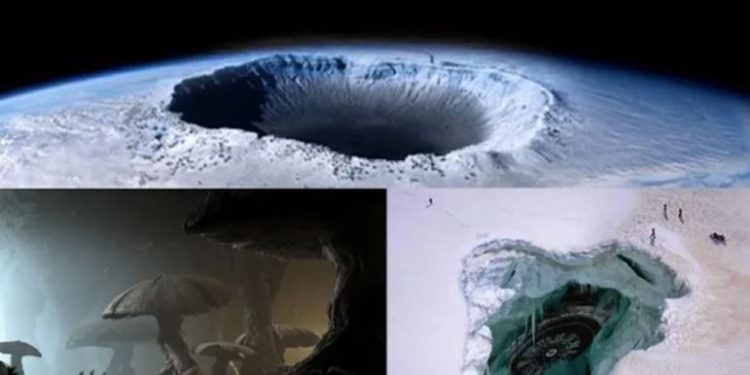The concept of a Hollow Earth, although seemingly absurd, has had its share of believers among scientists and politicians in the past. Even today, there are still a few dedicated supporters of this idea.

Renowned author and horror filmmaker Owen Egerton explores the intriguing concept of a civilization thriving within the Earth’s core in his latest novel, Hollow. The story follows a grieving religious studies professor who becomes captivated by the notion of an advanced society residing beneath the Earth’s surface.
In a recent episode of the Geek’s Guide to the Galaxy podcast (Episode 444), Egerton discusses his inspiration for the novel, stating, “Hollow represents the convergence of two of my interests: the Book of Job and the Hollow Earth Theory. Who would have thought these two would intersect? But I believe it was meant to be.”
Despite initially dismissing the Hollow Earth Theory as harmless fiction while writing his book, Egerton’s perspective underwent a transformation in light of certain events. He reflects, “I used to admire people’s ability to believe in something that clearly wasn’t real when I wrote about the Hollow Earth. However, as the novel progressed and Donald Trump was elected, I began to realize that these conspiracy theories weren’t as charming as they seemed. The potential for power to shift in dangerous ways became apparent.”
During the writing process, Egerton’s engagement with the Hollow Earth Theory led him to consider participating in an expedition to the North Pole in search of an entry point to the mysterious realm. According to the legends, massive openings known as Symmes Holes can be found near each of the Earth’s poles. Although the trip never materialized, Egerton remains intrigued by the possibility of such discoveries, musing, “Who knows? Maybe we won’t hear from them for a few years, and then they’ll emerge from the South Pole, reshaping our understanding of the world.”
The full conversation with Owen Egerton can be heard in Episode 444 of the Geek’s Guide to the Galaxy podcast. Below are some highlights from the discussion:
Egerton shares, “‘It exposed me to a group of like-minded jerks, and it was also my film school.’ I would stay and watch these peculiar films, some of which were masterpieces, while others were obscure drive-in flicks. Tim League, the founder of the drive-in, had acquired all the movies from a closing theater without knowing their contents. He invited anyone to come and watch them for free since he had no idea what the films were about. Together, we explored these movies, figuring them out as we went along.”
When it comes to directing, Egerton recounts his encounter with Jason Blum, saying, “One day, I received a call from Jason Blum, who said, ‘Yes, we want to acquire this script.’ I was ecstatic and responded, ‘That’s fantastic!’ But there was one condition: another group was interested but willing to let me direct it.” Egerton continues, “Jason Blum asked, ‘Oh, you want to direct, huh?’ I answered, ‘Yes.’ Then he asked, ‘Have you ever done it?’ ‘Yes,’ I said, ‘My first picture just played at Fantastic Fest a week ago.’ ‘Send me the link,’ he said. I sent it, and let me tell you, that day was nerve-wracking. ‘What’s happening?’ I wondered. Jason Blum is watching my film!’ Later that day, he contacted me and said, ‘We’ll work something out. Let’s get started.'”
Discussing the horror genre, Egerton expresses his belief in its enduring appeal. He remarks, “When bigger studios recognize the potential of horror, seeing what low-budget films can achieve by breaking the rules and providing audiences with unconventional experiences, they often swoop in to sanitize and commercialize the concept. We’ve seen this happen repeatedly with various franchises and intellectual properties. However, I believe that horror is still thriving. It’s not just about monetary gain; it’s about the diverse voices and perspectives that contribute to the genre, making it an enticing and ever-evolving landscape.”
In relation to his novel, Hollow, Egerton shares, “The ideas that resonate with me the most often begin with a nagging question.” He ponders, “What lies at the heart of the universe? Amidst the tragedies, loneliness, and separations, there is also beauty, such as sunrises and the innocence of infants. Both exist simultaneously, and I strive to understand what it all means. Does the cosmos possess a core, as the Book of Job suggests? I have delved into numerous interpretations and opinions on the matter, but I keep returning to the same question: What does it signify for the universe to be both cruel and beautiful?”
For the complete conversation with Owen Egerton, listen to Episode 444 of Geek’s Guide to the Galaxy podcast.





